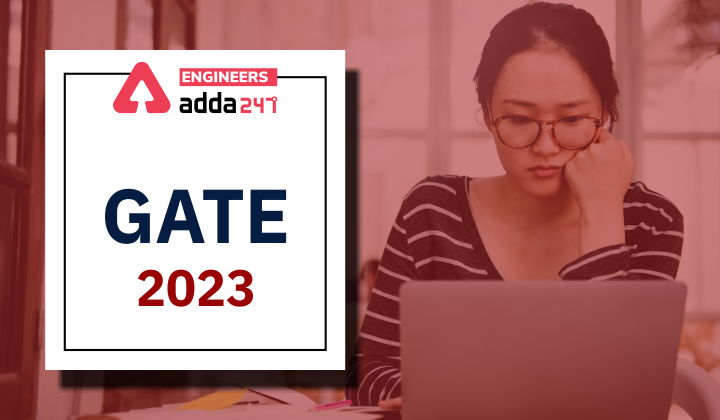The official website will publish the GATE 2023 Mechanical Engineering (ME) Exam Pattern. This year, no new alterations have been made to the ME paper pattern. The question paper for the GATE Exam Pattern for Mechanical Engineering (ME) is organised into three sections: General Aptitude, Engineering Mathematics, and Core Discipline. The General Aptitude portion accounts for 15% of the total weightage, whereas Engineering Mathematics and Core Discipline account for 13% and 72%, respectively.
The most crucial step before starting your preparation for GATE (ME) is going through the exam pattern, syllabus, marking scheme and other important details regarding the exam.
On that note, let’s learn about the GATE ME exam pattern, marking scheme, important topics and types of questions asked in the exam in detail.
| Exam Features | Details |
| Examination Mode | Computer Based Test (CBT) |
| Language | English |
| Duration | 3 Hours (180 Minutes) |
| Total Marks | 100 |
| Total Number of questions | 65 |
| Type of Questions | Multiple Choice Questions (MCQ); Multiple Select Questions (MSQ); Numerical Answer Type (NAT) Questions |
| Number of Sections | 3 (General Aptitude, Engineering Mathematics and Core Discipline) |
| Number of Questions in Each Section | General Aptitude- 10 questions, Engineering Mathematics & Core Discipline- 55 questions
|
GATE 2023 Mechanical Engineering (ME) Marking Scheme
The GATE 2023 Mechanical Engineering (ME) exam pattern is a 100-mark paper with 1 and 2 mark questions.
NATs and MSQs have no negative markings. However, for each wrong MCQ in the paper, marks will be deducted.
- 1/3 mark will be deducted for each incorrect 1 mark MCQ,
- 2/3 mark will be deducted for each incorrect 2 mark MCQ.
GATE 2023 Mechanical Engineering (ME)- Important Topics
Mechanical Engineering (ME) GATE Syllabus 2023 includes topics from General Aptitude, Engineering Mathematics, and Core Discipline. Each part also has subjects with important topics and sub-topics, which are listed below.
| Subjects | Important Topics |
| Thermodynamics | Laws of Thermodynamics, Pure Substance Properties and Thermodynamics Relation |
| Production Engineering | Metal Cutting, Machine tools, Computer integrated Manufacturing, Metrology & Inspection, Casting, Welding, Forming |
| Engineering Mathematics | Linear Algebra, Complex Number, Differential Equation, Limit & Continuity, Laplace, Probability and so on. |
| Theory of Machines | Simple Mechanics & their inversion, Balancing, Gyroscope, Vibration |
| General Aptitude | Numerical Reasoning & Verbal Reasoning |
| Industrial Engineering | Inventory, Sequencing, Queuing Theory, PERT & CPM |
| Machine Design | Fatigue Loading, springs, Brakes, Welded Joints |
| Fluid Mechanics | Flow-Through Jets, Fluid Machinery, Fluid Properties, Pressure & Manometry |
| Engineering Mechanics | Lagrange Equation |
| Strength of Materials | Stresses & strains, Beam Deflection and Bending |
| Heat-Transfer | Unsteady State of Conduction, Fins, Conduction, Radiation |
TYPES OF QUESTIONS
The GATE 2023 Mechanical Engineering exam’s first two sections are made up of multiple choice and numerical answer questions. The multiple-choice questions have four options, only one of which is correct. Candidates must submit a numerical value as the answer in numerical type questions sections. The following are the various types of questions that applicants are expected to answer:
- Recall – These questions are typically based on well-known facts, concepts, proven facts, equations, or rules from the mechanical engineering profession. Candidates are asked to solve the questions either by recalling answers from memory or by performing a one-line calculation.
- Comprehension – These questions assess the candidate’s knowledge and comprehension of mechanical engineering topics. In this section, candidates are expected to draw simple inferences based on fundamental concepts.
- Application – This section contains problems in which candidates must apply their knowledge either logically or computationally.
- Analysis and Synthesis – This section contains questions in a linked structure, which implies that the first question of the pair must be answered before the second or subsequent question. Candidates should also expect some common data questions, in which two questions share the same data but are unrelated to one another.
- Common Data Questions – This section’s questions are made up of several questions that are all related to a common data problem or passage. Based on the given data, many questions, say two or three, can be constructed. Each question in this section is worth two points, is self-contained, and can be solved independently.

Odyssey has been the lead content writer and content marketer. He has vast experience in the field of writing. His SEO strategies help businesses to gain maximum traffic and success.

